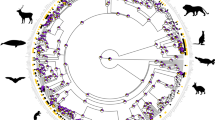Abstract
There are two ways to model the genetic evolution of social behaviour. Population genetic models using personal fitness1 –9 may be exact and of wide applicability, but they are often complex and assume very different forms for different kinds of social behaviour. The alternative, inclusive fitness models10 –12, achieves simplicity and clarity by attributing all fitness effects of a behaviour to an expanded fitness of the actor. For example, Hamilton's rule states that an altruistic behaviour will be favoured when −c + rb>0, where c is the fitness cost to the altruist, b is the benefit to its partner, and r is their relatedness. But inclusive fitness results are often inexact for interactions between kin1–5, and they do not address phenomena such as reciprocity13–15 and synergistic effects7,8,16 that may either be confounded with kinship or operate in its absence. Here I develop a model the results of which may be expressed in terms of either personal or inclusive fitness, and which combines the advantages of both; it is general, exact, simple and empirically useful. Hamilton's rule is shown to hold for reciprocity as well as kin selection. It fails because of synergistic effects, but this failure can be corrected through the use of coefficients of synergism, which are analogous to the coefficient of relatedness.
This is a preview of subscription content, access via your institution
Access options
Subscribe to this journal
Receive 51 print issues and online access
$199.00 per year
only $3.90 per issue
Buy this article
- Purchase on Springer Link
- Instant access to full article PDF
Prices may be subject to local taxes which are calculated during checkout
Similar content being viewed by others
References
Boorman, S. A. & Levitt, P. R. The Genetics of Altruism (Academic, New York, 1980).
Charlesworth, B. J. theor. Biol. 72, 297–319 (1978).
Templeton, A. R. Am. Nat. 114, 515–524 (1979).
Cavalli-Sforza, L. L. & Feldman, M. W. Theor. popul. Biol. 14, 268–280 (1978).
Uyenoyama, M. K. & Feldman, M. W. Am. Nat. 120, 614–627 (1982).
Wade, M. J. Am. Nat. 125, 61–73 (1985).
Matessi, C. & Jayakar, S. D. Theor. popul. Biol. 9, 360–387 (1976).
Cohen, D. & Eschel, I. Theor. popul Biol. 10, 276–302 (1976).
Wilson, D. S. The Natural Selection of Populations and Communities (Benjamin/Cummings, Menlo Park, 1980).
Hamilton, W. D. J. theor. Biol. 7, 1–52 (1964).
Seger, J. J. theor. Biol. 91, 191–213 (1981).
Michod, R. E. A. Rev. ecol. Syst. 13, 23–55 (1982).
Trivers, R. L. Q. Rev. Biol. 46, 35–57 (1971).
Axelrod, R. & Hamilton, W. D. Science 211, 1390–1396 (1981).
Brown, J. S., Sanderson, M. J. & Michod, R. E. J. theor. Biol. 99, 319–339 (1982).
Maynard Smith, J. in Current Problems in Sociobiology (eds. King's College Sociobiology Group) 29–44 (Cambridge University Press, 1982).
Price, G. R. Nature 227, 520–521 (1970).
Orlove, M. J. & Wood, C. L. J. theor. Biol. 73, 679–686 (1978).
Michod, R. E. & Hamilton, W. D. Nature 288, 694–697 (1980).
Queller, D. C. Biol. J. Linn. Soc. 23, 133–143 (1984).
Maynard Smith, J. Theor. popul. Biol. 18, 151–159 (1980).
Harvey, P. H., Bull, J. J., Pemberton, M. & Paxton, R. J. Am. Nat. 119, 710–719 (1982).
Bygott, J. D., Bertram, B. C. R. & Hanby, J. P. Nature 282, 839–841 (1979).
Falconer, D. S. Introduction to Quantitative Genetics 2nd ed (Longman, London1981).
Author information
Authors and Affiliations
Rights and permissions
About this article
Cite this article
Queller, D. Kinship, reciprocity and synergism in the evolution of social behaviour. Nature 318, 366–367 (1985). https://doi.org/10.1038/318366a0
Received:
Accepted:
Issue Date:
DOI: https://doi.org/10.1038/318366a0
This article is cited by
-
The Ways of Altruism
Evolutionary Psychological Science (2019)
-
Collapse and rescue of cooperation in evolving dynamic networks
Nature Communications (2018)
-
By genes alone: a model selectionist argument for genetical explanations of cooperation in non-human organisms
Biology & Philosophy (2017)
-
Group selection and contextual analysis
Synthese (2015)
-
Distinguishing Natural Selection from Other Evolutionary Processes in the Evolution of Altruism
Biological Theory (2015)
Comments
By submitting a comment you agree to abide by our Terms and Community Guidelines. If you find something abusive or that does not comply with our terms or guidelines please flag it as inappropriate.



